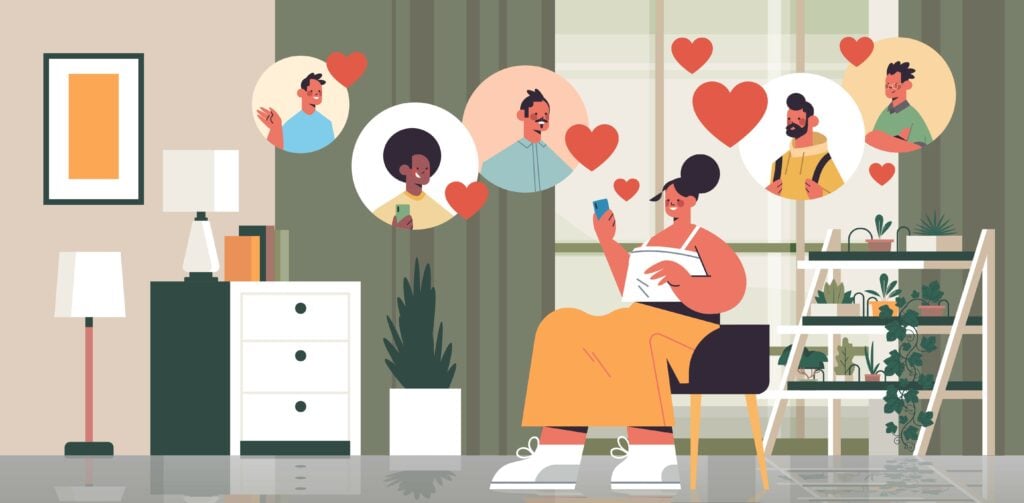Is the three-month rule for real?
Reviewed by Stephanie Steinman, PhD, CSAC


Picture this: You’re a couple of months into the kind of whirlwind romance you’ve only dreamed about. Your heart skips a beat every time your phone buzzes. You’ve shared laughs, dreams, and slices of your favorite pizza.


Before you know it, a few more weeks have zipped by. You realize you’re almost at the three-month mark—the moment, some say, when you should either commit or cut your losses.
Suddenly it feels like you’re a contestant on a game show where the host suddenly announces, “Time’s up! Make your choice.” You feel a knot in your stomach, a weight on your shoulders. Is this love or just infatuation? Are your date’s quirks charming or irritating? Is this what true happiness feels like, or have you just gotten comfortable?
Whether you realize it or not, your partner might be feeling the same pressure to define where the relationship stands. What is it about three months?
Why the early months are critical
Healthy relationships take time to develop. New relationships tend to pass through a few different stages, each with its own set of challenges.
- Attraction: Also known as the “infatuation” or “honeymoon” stage, this is when you feel like you’re in a euphoric state thanks to a cocktail of hormones from your brain. You’re at high risk of being swept away by the passion of the moment—meaning you might overlook potential issues that could disrupt your relationship down the line.
- Uncertainty: This stage is filled with questions. You’ve had some time to learn about each other, and you may be starting to question your compatibility, how you feel, and whether your feelings are mutual. Rumination and anxiety can sneak in, leading to doubts.
- Commitment or breakup: If your relationship survives the uncertainty phase and seems worth continuing, you agree to stay together. If not, you end the romance. Note that if this stage is either rushed or delayed for too long, it can cause problems and distress.
These early stages can unfold over a longer (or shorter) period than three months. But the three-month rule offers people a way to do several important things: prevent feelings from being hurt, minimize wasted time and energy, and move things to the next phase—either relationship growth or the freedom to explore other options.
The three-month rule and the “feelings gap”
In 2022, dating app Inner Circle reported that 68% of its users had a relationship end after three months because one partner wasn’t ready to commit.1 Around half of men and 38% of women reported acting impulsively in the early days, then reflecting on their actions later. They generally did this reflecting at—you guessed it—the three-month mark. If things didn’t feel right, they ended the relationship.
The “feelings gap” refers to the difference in time it takes for each partner to decide whether or not they want to stay together long-term. Given these findings, the three-month rule may help reveal the gap if it’s there.
Is three months a useful make-or-break timeline?
Not necessarily. Everyone experiences relationships differently, and it’s hard to find research on how long people take to decide if a romance has potential.
However, researchers have looked at the timing of other relationship milestones. Here are a few examples.
Doing the deed
In a YouGov survey of over 1,300 Americans, 19% thought it was appropriate for couples to start having sex between one and three months into the relationship—tied with 19% who thought it would be fine after the first week but before one month had passed.2 Among respondents who were currently married or in a serious relationship, 21% said they’d waited one to three months.
Saying those three little words
In the same poll cited above, 19% of respondents thought between one and three months into dating was the right time to say “I love you,” but 18% thought it should take longer—around four to six months.3
Other research shows that men tend to start thinking about expressing love at just over two months (70 days) on average, but they don’t actually do it until about three and a half months (108 days) into dating.4 Women weren’t far off, having thought about saying it by day 77 on average and actually saying it by day 123.
Meeting the family
In the YouGov survey, 22% of respondents said it’s appropriate to meet a partner’s family after one to three months, tied with 22% who think it should happen between four and six.5 These stats are on par with what some mental health professionals recommend: waiting around three months to introduce a partner to your family.6
Going exclusive
Having sex may or may not be a sign of commitment, but saying “I love you” and meeting the parents are pretty clear signs that you’re serious. Another way to mark an official transition to coupledom is to stop seeing other people.
In another poll of more than 1,000 Americans, 39% said that three months was the most acceptable time to talk with a partner about dating each other exclusively.7 A related survey showed that dating app users tend to move a bit faster: They felt exclusivity should be discussed after one to three months of dating.8 People who weren’t on the apps said three to six months was the most acceptable timeline for that conversation.
It’s worth being skeptical of the three-month rule
Three months may sound like a sweet spot for defining your relationship, but there are reasons to take it with a grain of salt.
The biggest problem with the three-month rule is its one-size-fits-all approach. The rule assumes all couples progress at a similar rate, when in reality every relationship is different and moves at its own pace.
By relying too much on a three-month timeline to reveal the fate of your relationship, you could mistakenly:
- Fail to address red flags
- Downplay any gut feelings until the three-month probation period is over
- Hold back on sharing your true emotions
- Invest too much in the relationship too early
- Rush to make a decision when you need more than three months to feel sure
Your romantic relationships are influenced by complex factors like your early childhood, your attachment style, your relationship history, your personality traits, your emotional needs, and your values. Beyond these, the growth and development of a relationship depend hugely on practical factors like physical distance, how well you communicate, and how much time you can spend building a connection.
Your true feelings may or may not rise to the surface around the three-month mark. Instead of worrying about a timeline, it’s best to be fully present and honest with yourself, your partner, and your relationship as it evolves.
How about a three-month guideline instead?
It’s absolutely fine to set a timeline if it helps you think about how your relationship is progressing. You just don’t want to be so devoted to that timeline that you suppress your authentic feelings or make rash decisions. Here’s how you can use three months as a helpful guideline rather than a mandate.
Practice self-reflection. Check in with yourself throughout the first few months and note any changes in your feelings or outlook. This can help you stay aware of your inner world and how it affects the relationship—as well as the effect of the relationship on you.
Be mindful of red flags. Don’t ignore warning signs that tell you there’s an issue. If something doesn’t feel right, trust your intuition and address it head-on rather than waiting until three months are up.
Stay present. Don’t get too far ahead of yourself by worrying about what will happen next or whether you’ll still be together in the future. Instead, focus on building a strong foundation and enjoy the process of getting to know each other.
Talk openly and authentically. You don’t have to dive into serious topics until you feel ready, but it’s important to be honest about what matters most to you. For example, if you have or want kids, that’s worth mentioning ahead of the three-month mark.
Be flexible. It’s reasonable to put a reminder in your calendar to talk about where you both stand at three months. Just remember that this timeline isn’t set in stone—it can change as you learn more about each other or if unexpected life events come up.
Pay attention to your gut feelings. You may want your dating experience to go a certain way, but your mind or body might sense when something is off. They may be trying to show you something about yourself, your partner, or the relationship that you can’t consciously see yet.
Get support. If you’re feeling overwhelmed or anxious, consider talking to a therapist or a relationship coach. They can offer personalized advice and strategies to improve your dating life and overall well-being.
The goal of dating is to find a partner who complements your strengths and contributes to your happiness. This shouldn’t come at the expense of your self-worth or emotional security. Enjoy the relationship journey as it unfolds, and trust yourself to make the right decisions along the way.

Sources
1 https://onthelist.date/dating-tips/the-feelings-gap/
2 https://today.yougov.com/topics/society/articles-reports/2021/08/03/relationships-dating-marriage-sex-milestones-poll/
3 https://today.yougov.com/topics/society/articles-reports/2021/08/03/relationships-dating-marriage-sex-milestones-poll/
4 https://journals.sagepub.com/doi/10.1177/02654075221075264
5 https://today.yougov.com/topics/society/articles-reports/2021/08/03/relationships-dating-marriage-sex-milestones-poll/
6 https://www.nytimes.com/2019/12/17/fashion/weddings/tips-for-meeting-the-parents.html/
7 https://www.ipsos.com/en-us/news-polls/half-of-Americans-believe-dating-worse-now-than-20-years-ago/
8 https://www.ipsos.com/en-us/dating-app-users-are-looking-for-love-quickly/
About the author
Elise Burley is a member of the therapist.com editorial team. She has more than a decade of professional experience writing and editing on a variety of health topics, including for several health-related e-commerce businesses, media publications, and licensed professionals. When she’s not working, she’s usually practicing yoga or off the grid somewhere on her latest canoe camping adventure.
Related articles

Sex, intimacy, and mental health
Safe, consensual sex between adults is a normal, healthy part of life. Learn...

Couples therapy: Who it’s for, how it works, and how to choose a therapist
If you and your partner find it hard to work through challenges in your...

The psychological effects of dating apps
Dating apps can help you find your person, but they can also be hard on your...

